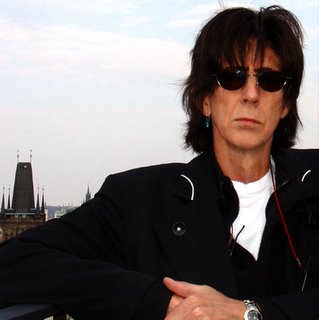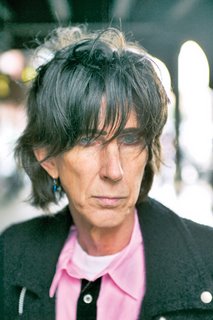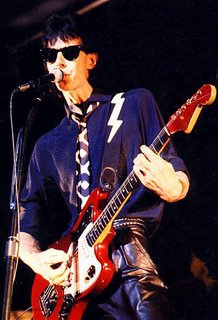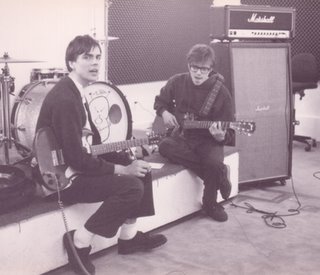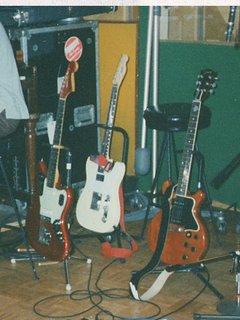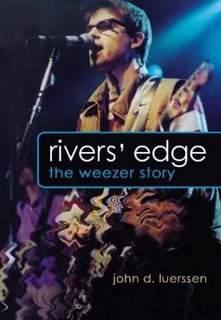 In the 2004 book "Rivers Edge" written by John D. Luerssen there is an actual chapter entitled The Cars. Although it is 99% about Ric and his dealings with the band during Weezer's Blue Album recording sessions It is chock full of quotes from Ric as well as accolades by Weezer's leader Rivers Cuomo about The Cars. Also provided is an interesting tidbit of what Ric knew about the the firing of original Weezer guitarist Jason Cropper and the adding of their present gutarist Brian Bell.
In the 2004 book "Rivers Edge" written by John D. Luerssen there is an actual chapter entitled The Cars. Although it is 99% about Ric and his dealings with the band during Weezer's Blue Album recording sessions It is chock full of quotes from Ric as well as accolades by Weezer's leader Rivers Cuomo about The Cars. Also provided is an interesting tidbit of what Ric knew about the the firing of original Weezer guitarist Jason Cropper and the adding of their present gutarist Brian Bell. Here's the entire excerpt from the book "Rivers' Edge: The Weezer Story" that deals with Ric and the Blue Album sessions.
After toying with the notion of self-producing their major-label debut -- which Geffen suits outright objected to -- the band selected Ric Ocasek, former frontman for the multi-platinum rock outfit the Cars. According to Rivers, "The record company was really pushing us to work with a producer, so we figured that if we had to have somebody in the studio with us, it might as well just be someone who writes good songs -- and the Cars' first record just rules. We sent Ric a tape and he called right back and said, 'You guys are great. I want to work with you.'"
"A day later, two days later, the record company called us up and said Ric's coming to your rehearsal today," Sharp recollected. "We were just like, 'Yeah, right, he's coming to our rehearsal.' But that day Pat saw him in a guitar store and he goes, 'Oh my god, maybe he is coming.' So he came to our rehearsal and hung out, and we were all pretty nervous. We'd never really dealt with anybody outside of the band at all."
"I got their demo from Todd Sullivan," Ocasek said over the phone in July 2003. "I had been in
During one practice, on August 6th, the band even finalized a cover of the Cars' 1978 smash single "Just What I Needed" in homage to their new producer. A few days later, Rivers, Pat, Matt and Jason flew to
"I had them in pre-production for at least a week, trimming it down," Ocasek recollected. "I wanted it to be a concise record that had a focal point. In pre-production they did Cars songs, which I thought was pretty cute."
"When we first met Ric, we were so freaked out by everything," remembered Matt Sharp. "We'd never met anyone famous. We were like, 'Oh my god, what's happening?' It was very hard to look at anybody eye-to-eye. But we milked him for all the Cars stories we could because we were all Cars fans." Cars albums released between 1978 and the band's demise in 1987 have sold a phenomenal 23 million copies so far in the
"I'd always admired the Cars and Ric Ocasek's songwriting and production skills," enthused Rivers. "I wasn't worried about him handling the band's heavier side. He'd produced Bad Brains and they're a lot heavier than us."
"We picked him . . . scratch that. I picked him because I liked and respected his songwriting," Rivers later said of Ocasek. "What we learned from him is actually kind of boring and technical. Before we met him, we always had our guitars on the rhythm pickup, which has a bassy, dull sound to it. That was the sound we liked at the time. But he convinced us to switch to the lead pickup, which is much brighter. I think when I wrote those songs originally, I was just sitting in the garage by myself and it sounded great when you're all by yourself, because it sounds heavy and bassy. But in the context of the full band, playing at Club Dump, that pickup just sounds really . . . dull. And he got us to brighten it up. It made a huge difference, I think, in the way we sound."
At Ocasek's urging, the band left the comforts of
Fifteen songs were tracked during Weezer's first New York practice session, but four songs -- "Lullaby for Wayne," "Getting Up and Leaving," "I Swear It's True," and an alternate version of "In the Garage" -- were eliminated as contenders for Weezer. A fifth tune from this session, "Mykel & Carli," would be attempted but abandoned only to be recorded the following year when it was relegated to B-side status. For the album, Ocasek and the band came to agreement on ten songs. They were: "My Name Is Jonas," "No One Else," "The World Has Turned and Left Me Here," "Buddy Holly," "Undone -- The Sweater Song," "Surf Wax America," "Say It Ain't So," "In the Garage," "Holiday" and "Only in Dreams."
The actual recording of Weezer's debut got underway at Electric Lady Studios in late August 1993. While in
"The plan was to do a quick record over the span of just three weeks or something," said Ocasek. "The real fun came when we started to record at Electric Lady. That's where the personalities developed and I got to see just how artistic Rivers really was. A lot of times we had little talks about which songs we should do. I remember at one point he was hesitant to do 'Buddy Holly' and I was like, 'Rivers, we can talk about it. Do it anyway, and if you don't like it when it's done, we won't use it. But I think you should try. You did write it and it is a great song.' He was up for doing almost anything. I had a good relationship with him, because I wouldn't make him do anything he didn't want to do. I was just sort of there to guide him."
So, what really went down? Rewind to September 1993 as producer Ocasek remembered the whole ordeal a little differently. "They weren't like a happy-go-lucky band anyway," said Ocasek, who has gone on to man the boards for the likes of No Doubt, Guided By Voices, and Bad Religion. "In the middle of that record he fired the guitar player," Ric divulged. "He called me when the record was finished, the day before we were supposed to start mixing, and said, 'Listen, I just fired the guitar player.' So I said, 'What are you gonna do now?' He's like, 'I want all of his parts off the record.'"
